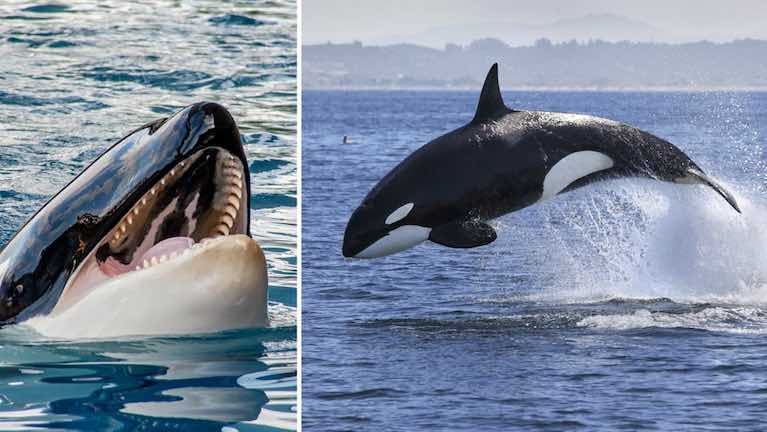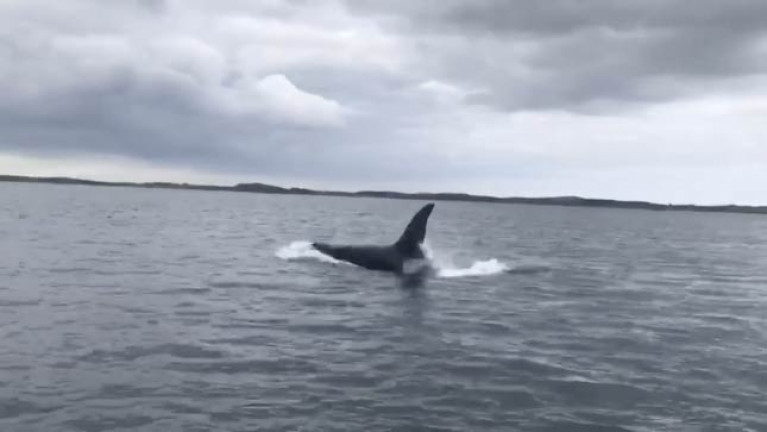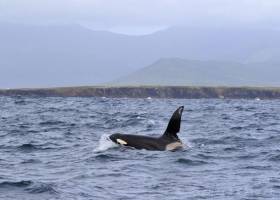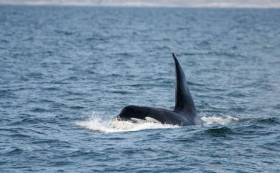Displaying items by tag: orca
The Cruising Association (CA) has launched an updated online portal and web pages for orca information and reporting, resulting from a year-long effort to gather and analyse data on orca interactions.
The updates to the portal and web pages reflect the research and analysis that the CA has undertaken since June 2022 and include the sharing of additional safety and deterrent advice, updated reporting forms and links to other resources, including current orca locations.
In June 2022, the CA launched its portal – available in English, French, Portuguese and Spanish – in collaboration with Grupo Trabajo Orca Atlantica (GTOA), to share information and gather reports from skippers on orca interactions and uneventful passages. The initiative was in response to the increasing trend of behaviour demonstrated since 2020 within a population of orcas that feeds on and follows the migration of tuna exiting the Mediterranean from the Strait of Gibraltar and heading West and North around the Iberian Peninsula.
In 2022 two yachts were sunk due to interactions with orcas, and another yacht met the same fate in early May 2023. While fortunately, all crew members were rescued, this situation is of great concern to cruising sailors located within or transiting through the affected area, and there is only limited evidence-led advice available to help.
Research and Analysis
The CA orca project team has analysed over 300 interactions and uneventful passage reports received in 2022, and some patterns have emerged, which are shared on the portal. Of the 132 interactions, 99 yachts experienced damage.
The comparative data is published, with the CA portal the only database that is publicly accessible for use by sailors, scientists, and others interested in the data.
By gathering as much information as possible, the CA and GTOA will be better equipped to identify factors that may help reduce the risk of an interaction, along with those actions taken by a skipper, which are effective or not.
Online Reporting
Skippers are urged to submit orca interaction, and uneventful passage reports through interaction hotspots. The CA reporting portal is considered the central platform to monitor in detail interactions and uneventful passages, as it gathers comprehensive information in a structured way.
Data gathered includes sea state/wind speed, boat speed, day/night, cloud cover, distance off the land, sea depth, hull/antifoul colour, type of rudder, use of autopilot and depth sounder etc. Additional data fields added for 2023 include details on the number of orcas (whether adult or juvenile) in contact with the boat, whether trailing a fishing lure and reversing technique. These new fields are intended to test scientific theory-based advice and to look for best practices when reversing.
Stay Safe
Although various deterrent measures are discussed, there are currently no reliable legal methods. The CA portal provides a ‘Safety Protocol’ and a list of potential, yet unproven, deterrent measures. Examples include staying close to shore, staying in shallow water, using sand as a screen, reversing and making a noise onboard.
The CA will continue to share progress and information with the cruising community. You can find out more at www.theca.org.uk/orcas.
Orca Avoidance by Cruising Boats - is Backing Off the Safest Method?
Portuguese-based cruising enthusiast John Duggan of Cascais and originally Malahide has been monitoring the continuing situation with orca attacks on the rudders of cruising boats off the Iberian coast, and has posted this update today:
"Anyone with a boat in the Atlantic waters of Spain and Portugal will be aware of a recent spate of damage done by orcas (killer whales) to the rudder and steering gear of yachts. More than two dozen boats have needed external assistance, and the Spanish authorities have ordered the exclusion of boats of less than 15M from an area between Tarifa and Cape Trafalgar.
The official advice when dealing with an aggressive approach by orcas is to take down the sails, stop the engine and echo sounder, and not touch the wheel in the hope that eventually the orcas will simply mvd on. But the effectiveness of these measures is uncertain, and a Portuguese sailor has recently reported success with another technique - to go astern under power slowly at 2-3 knots. The idea is that the orca will want to stay clear of the propeller, and will not easily be able to bash against the rudder.”
Mr Duggan has asked us to point out that he accepts no responsibility whatsoever for any boat which has to motor astern all the way across the Bay of Biscay with an increasingly irritated pod of orcas following at the bow.
 Seasoned sailor. Orca observer John Duggan on mainsheet trim aboard Otto Glaser’s 47ft McGruer sloop Tritsch-Tratsch II in the i975 Howth-Holyhead Race - in which she took line honours and the Class 1 win - with Olympic sailor Barry O’Neill beyond on the wheel. Photo: W M Nixon
Seasoned sailor. Orca observer John Duggan on mainsheet trim aboard Otto Glaser’s 47ft McGruer sloop Tritsch-Tratsch II in the i975 Howth-Holyhead Race - in which she took line honours and the Class 1 win - with Olympic sailor Barry O’Neill beyond on the wheel. Photo: W M Nixon
Late last summer and into the Autumn, there were several reports of orcas – "killer whales" if you want to be more sensational – getting decidedly friendly to the point of aggression with fishing boats and sailing cruisers off the coasts of Spain and Portugal.
They seem to be back in business, but now it's off the coast of the Algarve, and Galicia-based sailor Jose Manuel Baldor Gutierrez has posted some vids showing a pair taking more interest than was comfortable in his 45-footer off Portugal's southern shore.
He reports:
"These videos are of what happened yesterday when sailing gently along on the south coast of Portugal, 12 miles from Cape Santa Maria in Faro. I don't know much about the subject of orcas and whales generally, but when the stern of the boat was suddenly turned 90 degrees, I thought at first it was a complete autopilot failure.
But immediately when I saw the orcas, I disconnected the autopilot, and then turned off all the other electronics and electrics by disconnecting the batteries. However, seeing that the orcas were still very much there, it seemed best to stop the boat moving altogether.
So we took all the sails down and left the boat to roll gently in the light winds, while the two of us got into the little bathtub to minimise our presence and maximise the number of protective layers between us and the orcas, should they decided to step up the attention in a more confrontational way.
We'd been "hiding" in the bathtub for a very long 10 to 15 minutes until – with the boat "dead" - they finally lost interest and left. But we waited another even longer 15 minutes before we re-connected the batteries and started sailing with very little wind, at first not using the engine and minimizing the changes to the rudder direction.
My feeling is that their interest is primarily in the rudder, as its movement suggests it's the only living part of the boat – they go to this mobile hull zone, because they can do nothing on the keel or bow. But having seen the sheer power evident in the way they spun our boat through 90 degrees with very little effort, it could be that accidents will happen if you try to control the rudder by hanging on to the wheel – you could end up with damaged arm and shoulder muscles, or even with a broken tiller arm on the rudder stock.
Now we know a little bit more about orcas, and luckily the experience ultimately went well"
Mystery of Orca Whale Attacks on Boats Continues off Spanish Coast
Stories of whales attacking boats at sea and sometimes sinking them go back a long way in maritime history, and as often as not it has happened in such a sudden and frightening way that identifying the precise species has not been part of the narrative.
But since mid-September, an increasing number of reports of whale attacks off the coast of Spain and Portugal have identified the largest dolphin, the orca or "killer whale", as being responsible for a continuing spate of attacks. And with verified incidents of rudders being torn off and hulls and keels - usually of fibreglass sailing boats – being seriously damaged, the maritime authorities in northwest Spain have become so concerned that a quite extensive exclusion zone for smaller craft has been imposed off the rugged coastline between El Ferrol and Punta de Estacia de Bares.
 The exclusion zone for smaller craft off the rugged coastline between El Ferrol and Punta de Estacia de Bares
The exclusion zone for smaller craft off the rugged coastline between El Ferrol and Punta de Estacia de Bares
Several theories have been put forward to explain the unusually high incidence of these events, and in response to sensationalist local headlines of "TERROR KILLER WHALE ATTACKS", noted ocean voyager and marine scientist Vera Quinlan of Galway has made the reasonable point that it is humans invading their space who have described them as "killer" whales. They are in fact the largest species of dolphins, and it takes some of the heat out of the situation to give them their proper name of orca.
Nevertheless, the danger can ultimately be very real, and theories abound, such as the behaviour being a hostile response by whales to the sudden and marked increase in engine and propellor noise after some limitations of the pandemic lockdown was lifted in Spain, with coastal leisure traffic increasing to end a period of peace which was akin to the welcome silence which until recently prevailed onshore around noisy airports.
But as to whether or not it's an inbuilt whale dislike of fibreglass is difficult to assess, as the vast majority of boats have long since been constructed in GRP.
It's also said that modern hull shapes with the keel separate from the rudder may seem to whales like some sort of threatening sea creature, while another notion is that the whales approach the boat with very friendly or indeed amorous intentions, and then take a whack at it on being found they were mistaken.
As for keeping the engine running, the fact is a number of the attacks have taken place on boats which were motor-sailing.
And finally, there are those who reckon that the colour of your underwater paint is a significant factor. Old salts will tell you that having a white or red under-body is just asking for trouble – dark blue or black anti-fouling is your only man if you want to stay onside with the ocean cousins.
Orca Killer Whales Spotted in Strangford Lough (VIDEO)
A pod of orcas or killer whales caused great excitement in Strangford Lough, County Down yesterday. As reported by BBC News NI, local skipper Richard Connor from Causeway Boats said that it may be unusual but not unheard of. It was the third time he had seen them in 22 years of skippering.
Biologist Suzanne Beck from the Agri-Food and Biosciences Institute said the group that was in the lough are part of the West Coast community and may be seen a few times a year. "Usually they might travel on round the coast and the guys in the Hebrides might get a sighting and later they may travel right round Ireland, so you do hear of them every so often. They're just doing this circuit around us the whole time and it's only when they come close to the coast that we're getting these lucky sightings” They could have come in to chase a seal or been interested in different noises, but the concern was that they may keep travelling up through the Lough.
According to the Irish Whale and Dolphin Group NI they were initially reported yesterday afternoon several miles off Ardglass on the County Down coast before they pushed north into Strangford Narrows. “We can confirm from the presence of the bull known as "John Coe" that they are from the Scottish West Coast Community Group, which today has a core group of just seven or eight remaining individuals. They are recorded most years on a few occasions in Irish waters and this is the eighth time this apex predator has been recorded along the Co. Down coast since 2001. This is however not the first time killer whales have entered Strangford Narrows as a pod of four were photographed on Regatta Day off Portaferry on Aug. 18th 1962”. It was an exciting sight for children.
The McCarthy family got wind it was happening from the Irish Whale and Dolphin Group NI's Facebook page and decided to take a quick detour. “When we arrived, they were on the turn back and there were three boats near them”, Mr McCarthy said. I was concerned that it could turn into an awkward situation if they didn't find their way out through the Narrows but they seemed to make their way back fairly comfortably". He said the three boats out with them "did a good job of holding back". "It was a stunning night and what a treat," he added.
Kerry Treated To Rare Sighting Of Killer Whale 'John Coe'
#MarineWildlife - Whale watchers on Slea Head were treated to a special sight earlier this week with the surprise appearance of the killer whale known as John Coe, as the Irish Examiner reports.
Landscape photographer Richard Creagh was among the lucky few on Monday (27 June) to spot the orca known by the distinctive notch on his dorsal fin – though in more recent times he's also lost a chunk of his tail fluke, most likely to a shark bite.
Creagh, a keen marine wildlife watcher for the last 10 years, said: "Up to now killer whales had always eluded me but today I got to add them to my list, and what a sight it was! I’m still buzzing!"
John Coe's unique orca pod are regular visitors to Irish waters, though he himself was last spotted close to our shores almost three years ago at the Inishkeas in Co Mayo, according to the Irish Whale and Dolphin Group – which is asking the public to watch the seas for any more sightings of the senior cetacean.
#DopeyDick - A killer whale who gained notoriety after swimming up the River Foyle in the late 1970s has been rediscovered enjoying his retirement off the west coast of Scotland, as the Derry Journal reports.
It's more than 38 years since the orca astounded the people of Derry by swimming up the estuary and hanging around the city for a number of days, earning the name 'Dopey Dick' for shrugging off attempts to lure him back to the safety of open water.
His whereabouts thereafter were unknown -- till cetacean experts with the Hebridean Whale and Dolphin Trust compared old photographs of his Derry visit with more recent images of the unique orca community that makes its home off the western Scottish coast, and identified a positive match.
Comet, as the orca is properly known, is estimated to be at least 58 years old, double the usual life expectancy for the species.
But that's not so surprising for the orca pod referred to as the 'West Coast Community', which has been a regular visitor to Irish waters over the years, and has interested marine wildlife specialists for decades due to its "evolutionary significant" qualities.
Sadly that group's numbers have been dwindling, with fellow orca Lulu becoming the latest victim after its believed she was entangled in fishing gear early this year, as previously reported on Afloat.ie.
#MarineWildlife - The killer whale found beached on a Scottish island last weekend likely died after getting entangled in fishing gear for days, say experts.
As previously reported on Afloat.ie, the orca known as Lulu to researchers, who have been tracking her unique pod since the early 1990s, was discovered on the island of Tiree in the Inner Hebrides last Sunday 3 January.
Lulu's "evolutionary significant" group has been under threat for years due to the absence of calves among its number since scientists began monitoring them around the Scottish and north Irish coasts.
But according to The Press and Journal, Lulu's death was not down to natural causes – with a post-mortem report from experts at the Scottish Marine Animal Strandings Scheme claiming "convincing evidence that she had become chronically entangled" in fishing gear, with deep wounds consistent with a rope wrapping around her tail.
“There were no ropes or gear left on the carcass," said the scientists in a statement. "We’re assuming all this from the lesions we found on her body, so we don’t know if this was due to active fishing gear, abandoned or ‘ghost’ gear, or other marine debris."
The Press and Journal has much more on the story HERE.
Unique Scottish Orca Pod Loses Another Member
#MarineWildlife - One of the last remaining members of a unique pod of killer whales has been found dead on a Scottish island.
As STV News reports, the orca known as Lulu to marine researchers was found beached on the island of Tiree in the Inner Hebrides on Scotland's west coast on Sunday 3 January.
Like John Doe, who is believed to have survived an altercation with a shark a year ago, Lulu was one of a familiar family of orcas that's regularly seen off Scotland and even as far west as the Donegal coast.
It's a pod that's piqued the interest of marine science due to its genetic distinctiveness from other orcas in the North Atlantic, as previously reported on Afloat.ie.
But the "evolutionary significant" group's numbers have been dwindling in recent years due to the absence of calves since scientists started tracking them more than two decades ago.
"It is particularly sad to know that another one of these killer whales, unique to the British and Irish Isles, has died," said the Hebridean Whale and Dolphin Trust. "There may be as few as eight individuals remaining in this population."
STV News has more on the story HERE.
Killer Whale Snacks On Seal Pup In Irish Sea
#MarineWildlife - A seal pup was lunch for a killer whale that's been attracting onlookers to Wales' Irish Sea coast in recent days.
As the Carmarthen Journal reports, the orca was first sighted of Mwnt, north of Cardigan, over the summer, but has since been spotted further down the coast near Fishguard - believed to be attracted by a boom in the local seal population.
It marks a rare appearance for the species in the Irish Sea, as they're more commonly spotted in Scottish waters and off Ireland's North Coast.
And it comes not long after another rare sight in the form of a pod of Risso's dolphins sighted near Anglesey in north Wales earlier this month - with experts telling BBC News that it may be one of the largest such pods ever recorded in Welsh waters.
In other marine mammal news, The Irish Times has video of a seal who appears to have taken a liking to Dublin city centre, swimming many kilometres up the Liffey from the usual Dublin Bay haunts.




























































